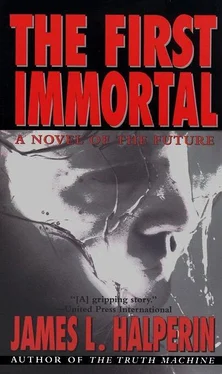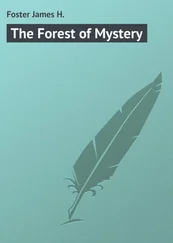“Yes. Good idea. Please, can’t I come visit you in the hospital tonight? I’ll bring Sarah.” The last offer was added in the tone of a parent bribing a child with the promise of ice cream.
This touched Ben’s ailing heart. “It’s past visiting hours. I’ll drop by tomorrow, as soon as they let me out of this paradise-on-earth. Don’t worry, honey. I’m fine.”
After Ben hung up, Jan sobbed to her husband, “Dad’s had a heart attack.”
Noah hugged her, and there was neither passion nor comfort in the embrace. “He’s okay?”
“So he said. But he wanted me to write up a new will for him.”
“When’ll you talk to him about it?”
Jan stared at Noah, who wanted her to write her own father’s dying declaration! Revulsion overwhelming her sadness, she managed to answer, “He’s gonna find a trust and estates specialist instead.”
“Why?” Noah asked, too sharply.
“Because I can’t write my own father’s goddamn will, that’s why!”
“Okay, okay. I was just thinking we could use the business.”
“I don’t charge him for legal work.”
“Yeah, I forgot,” Noah said. “Still, we might want to keep an eye on things, don’t you think? It’s not just us anymore. We have a daughter to think about now.”
“Bullshit.”
November 5, 1982
Ben sat at his office desk during a rare lull in his work schedule; no patients in the waiting room, no appointments for the next twenty minutes, no follow-up calls needing to be made right then. He finally had a moment to think, and what he thought was: Ben, that was dumb, dumb, dumb! He was damned lucky he hadn’t died on that airplane.
Seven days had passed. He felt much better; still a bit sluggish, but okay. He intended to resume his walking that evening, covering shorter distances at a slower pace.
First he dialed his son’s number, and got the answering machine, as he had for each of the last five days.
He waited for the beep. “Gary, it’s me again. You out of town or just don’t feel like talking to me? Can’t say as I’d blame you, but some forces of nature won’t be subdued, and I’m one of them. By the way, I happened to notice some of your paintings in a gallery on Newbury Street. Had no idea paintings could be that expensive unless the artist was dead. Or is that why you haven’t called me back? Anyway, a woman of obvious good taste was admiring the big green one with the hummingbirds and that incredible sunset. I told her she’d better put her name on it. Didn’t mention you were my son, of course. She finally did put down a deposit on it. You know how persuasive I can be. Anyway, you might as well call me back, or you’ll have to listen to these messages every goddamn day for the rest of your life. Well, ‘bye for now.”
He dropped the receiver into the cradle and stared at the oak wall in front of him. Damn! He wondered if Gary was really out, or sitting home listening to that.
Needing to fill the time with something, anything, possessing some semblance of productivity, Ben looked through a pile of papers. He found the note he’d written to himself after returning from Mack’s burial, and called Arizona directory assistance.
The Phoenix Life Extension Foundation had a listed phone number. He reached David Perez, the membership administrator. Perez was an articulate fellow and quite personable. It surprised Ben to learn that the place was indeed a cryonics facility. A mild disappointment.
“You’re like that company in Sacramento I read about a few years ago?” Ben asked.
“Same concept, better execution.” Perez laughed. “You’re referring to California Cryonics Limited, I assume.”
“Sounds right.”
“They made some serious mistakes, but we think their concepts were sound. Think of them as the Titanic ; think of us as the Queen Elizabeth Two .”
“An apt analogy, I hope. Talk to me.”
“Over time,” Perez began, “scientific progress has allowed people to live longer. Already we estimate that medical science is adding two months to the average life expectancy of each American every year. Eventually science will discover a way for humans to have an indefinite life span. It’s a matter of ‘when,’ not ‘if.’ But few if any people alive today are likely to reach that point before being overcome either by disease or calamity. So for those of us who don’t make it to that time, the only way to survive is to have ourselves frozen after we die. At ultralow temperatures, all metabolic change virtually ceases. Theoretically, a person’s body could be preserved indefinitely.”
Ben remembered his conversation with Epstein a dozen years earlier, and felt a sudden chill. Even if it were legitimate, he couldn’t see anyone voluntarily submitting to such a thing.
What if you were actually aware of being frozen—with no hope of escape? He imagined himself lying in a block of ice, unable to move for decades, or centuries, but still alive. Even the hellish bowels of that Jap ship had been a better prospect, he decided. As bad as that was, the journey had been finite. Being frozen alive, trapped in an icy coffin, guaranteed no such redemption.
“People let you put their bodies on ice?” he asked.
“We use liquid nitrogen, actually,” Perez explained. “And people don’t just let us, they pay us to do it! We have over a dozen people in suspension now, and fifty-six others signed up, including me. Which makes us the largest cryonics facility in the world.”
The largest in the world? Ben thought. If cryonics were really viable, after being available for twenty years, why hadn’t more people signed up? It couldn’t have just been the money; any possibility of another chance at life should have been priceless to a dying person.
“Of course,” Perez continued, almost as if he’d read Ben’s mind, “nobody’s ever been revived, and there’s no proof any of us will ever be; it’s purely theoretical. Neither the science nor the requisite technology exists yet. Cryonics is a statement of hope that humankind will ultimately achieve both.”
Or maybe more like an affidavit of insanity, Ben thought. He figured he might as well listen, though. “When I was younger, much younger,” he prompted, “I used to think we’d be able to stop the aging process during my lifetime. Thought I might live forever.”
“Still might, you know. We don’t make promises, of course, but since everyone’s going to die anyway, you wouldn’t have much to lose by being frozen, would you? Anyone who’s buried or cremated will never be revived, but if you’re frozen quickly enough at the point of death, before all the information in your brain’s lost, well, who knows what science will be able to do in fifty or a hundred or five hundred years?”
It was nutty, but at least Perez didn’t seem to be lying about anything—so far. “What happens to your soul when you’re on ice?”
“People always ask us that,” Perez said. “Nobody knows if there’s really a soul separate and apart from the body. But I gather from your question that you’re a religious man, so let’s assume you have such a soul. And let’s say your suspension lasts even five hundred years. That’s a long time for a body, but if a soul’s eternal, it’s probably not too much to expect it to find its way home.”
“Interesting. Weird, but interesting.”
“And in the eyes of God, half a millennium would be insignificant, wouldn’t it? We can’t be sure, but I’d assume your soul won’t mind cooling its heels for a lousy five hundred years.” Perez chuckled, the sincere laugh of a man who believed in his own product.
“You’re one helluva salesman,” Ben granted. “You don’t have to answer this if you don’t want, but how much money will they pay you if you sign me up?”
Читать дальше












